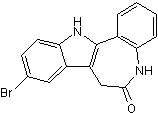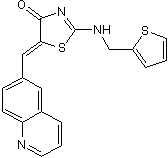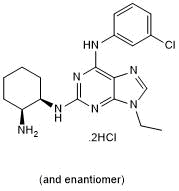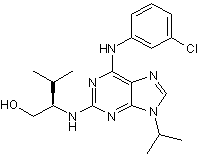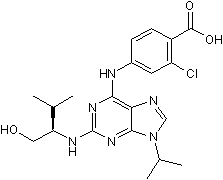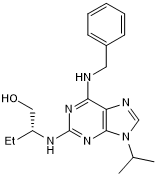CDC2/CDK1 Products
CDC2 (Cell Division Cycle 2), also known as CDK1 (Cyclin Dependent Kinase 1), is a member of the CDK family of serine/threonine kinases. The CDKs are important regulators of cell cycle progression and their activities are largely controlled by association with Cyclins, and activating and inhibitory phosphorylations. Entry into mitosis is initiated by CDC2. Full activation of CDC2 requires phosphorylation at T161 and association with CyclinB. In contrast, phosphorylation of CDC2 at Y15 and T14 during the G2-phase of the cell cycle inhibits activity, and dephosphorylation of Y15 and T14 by CDC25 phosphatase during late G2 restores activity.
63 results for "CDC2/CDK1" in Products
63 results for "CDC2/CDK1" in Products
CDC2/CDK1 Products
CDC2 (Cell Division Cycle 2), also known as CDK1 (Cyclin Dependent Kinase 1), is a member of the CDK family of serine/threonine kinases. The CDKs are important regulators of cell cycle progression and their activities are largely controlled by association with Cyclins, and activating and inhibitory phosphorylations. Entry into mitosis is initiated by CDC2. Full activation of CDC2 requires phosphorylation at T161 and association with CyclinB. In contrast, phosphorylation of CDC2 at Y15 and T14 during the G2-phase of the cell cycle inhibits activity, and dephosphorylation of Y15 and T14 by CDC25 phosphatase during late G2 restores activity.
| Reactivity: | Human, Monkey, Bovine, Rat (Negative), Mouse (Negative), +3 More |
| Details: | Mouse IgG2a Kappa Monoclonal Clone #POH-1; same as cdc2.1 |
| Applications: | IHC, WB |
| Reactivity: | Human, Monkey, Bovine, Rat (Negative), Mouse (Negative), +5 More |
| Details: | Mouse IgG2a Kappa Monoclonal Clone #CDK1/873 |
| Applications: | IHC, WB |
| Reactivity: | Human, Monkey, Bovine, Rat (Negative), Mouse (Negative), +5 More |
| Details: | Mouse IgG2a Kappa Monoclonal Clone #CDK1/873 |
| Applications: | IHC, WB |
| Reactivity: | Human, Monkey, Bovine, Rat (Negative), Mouse (Negative), +5 More |
| Details: | Mouse IgG2a Kappa Monoclonal Clone #CDK1/873 |
| Applications: | IHC, WB |
| Reactivity: | Human, Mouse, Rat |
| Details: | Rabbit IgG Polyclonal |
| Applications: | IHC, WB, ICC/IF |
| Reactivity: | Human, Mouse, Rat, Monkey, Primate |
| Details: | Mouse IgG1 Monoclonal Clone #2G9 |
| Applications: | IHC, WB, ELISA, ICC/IF |
Recombinant Monoclonal Antibody
| Reactivity: | Human, Mouse, Rat |
| Details: | Rabbit IgG Monoclonal Clone #PSH03-42 |
| Applications: | IHC, WB, ICC/IF, Flow |
| Reactivity: | Human, Mouse, Xenopus |
| Details: | Rabbit IgG Polyclonal |
| Applications: | WB |
| Reactivity: | Human, Mouse, Rat |
| Details: | Rabbit IgG Polyclonal |
| Applications: | IHC, WB |
| Reactivity: | Human, Mouse, Rat |
| Details: | Mouse IgG2a Lambda Monoclonal Clone #8F1 |
| Applications: | IHC, WB, ELISA |
| Reactivity: | Human |
| Details: | Mouse IgG1 kappa Monoclonal Clone #1A4-1A9 |
| Applications: | IHC, WB, ELISA, ICC/IF |
| Reactivity: | Human, Mouse |
| Details: | Rabbit IgG Polyclonal |
| Applications: | WB |
| Reactivity: | Human |
| Details: | Rabbit IgG Monoclonal Clone #6P7X9 |
| Applications: | WB, ELISA |
| Reactivity: | S. pombe |
| Details: | Mouse IgG2B Monoclonal Clone #Y100.4 |
| Applications: | WB |
| Reactivity: | S. pombe |
| Details: | Mouse IgG2B Monoclonal Clone #Y100.4 |
| Applications: | WB |
| Reactivity: | S. pombe |
| Details: | Mouse IgG2B Monoclonal Clone #Y100.4 |
| Applications: | WB |
| Reactivity: | S. pombe |
| Details: | Mouse IgG2B Monoclonal Clone #Y100.4 |
| Applications: | WB |
| Reactivity: | S. pombe |
| Details: | Mouse IgG2B Monoclonal Clone #Y100.4 |
| Applications: | WB |
GSK-3β inhibitor; also inhibits cdks
| Chemical Name: | 9-Bromo-7,12-dihydro-indolo[3,2-d][1]benzazepin-6(5H)-one |
| Purity: | ≥98% (HPLC) |
Cdk inhibitor; potently inhibits cdk1, 2, 5 and 9
| Chemical Name: | 4-[2-Methyl-1-(1-methylethyl)-1H-imidazol-5-yl]-N-[4-(methylsulfonyl)phenyl]-2-pyrimidinamine |
| Purity: | ≥99% (HPLC) |
Cdk1 inhibitor
| Chemical Name: | 5-(6-Quinolinylmethylene)-2-[(2-thienylmethyl)amino]-4(5H)-thiazolone |
| Purity: | ≥98% (HPLC) |
Potent CDK1 inhibitor
| Chemical Name: | rel-N2-[(1R,2S)-2-Aminocyclohexyl]-N6-(3-chlorophenyl)-9-ethyl-9H-purine-2,6-diamine dihydrochloride |
| Purity: | ≥98% (HPLC) |
Cdk inhibitor; potently inhibits cdk1, cdk2 and cdk5
| Alternate Names: | NG 60 |
| Chemical Name: | (2R)-2-[[6-[(3-Chlorophenyl)amino]-9-(1-methylethyl)-9H-purin-2-yl]amino]-3-methyl-1-butanol |
| Purity: | ≥98% (HPLC) |
Selective cdk inhibitor; potently inhibits cdk1, cdk2 and cdk5
| Alternate Names: | NG 95 |
| Chemical Name: | (2R)-2-[[6-[(3-Chloro-4-carboxyphenyl)amino]-9-(1-methylethyl)-9H-purin-2-yl]amino]-3-methyl-1-butanol |
| Purity: | ≥99% (HPLC) |
Cdk inhibitor
| Alternate Names: | CYC 202,Seliciclib |
| Chemical Name: | (2R)-2-[[9-(1-Methylethyl)-6-[(phenylmethyl)amino]-9H-purin-2-yl]amino]-1-butanol |
| Purity: | ≥98% (HPLC) |

![Western Blot: CDC2/CDK1 Antibody (POH-1; same as cdc2.1) [NBP2-34331] Western Blot: CDC2/CDK1 Antibody (POH-1; same as cdc2.1) [NBP2-34331]](https://resources.bio-techne.com/images/products/CDC2-CDK1-Antibody-POH-1;-same-as-cdc2-1-Western-Blot-NBP2-34331-img0003.jpg)

![Immunohistochemistry-Paraffin: CDC2/CDK1 Antibody [NBP1-85729] Immunohistochemistry-Paraffin: CDC2/CDK1 Antibody [NBP1-85729]](https://resources.bio-techne.com/images/products/CDC2-CDK1-Antibody-Immunohistochemistry-Paraffin-NBP1-85729-img0015.jpg)
![Western Blot: CDC2/CDK1 Antibody (2G9)BSA Free [NBP2-37626] Western Blot: CDC2/CDK1 Antibody (2G9)BSA Free [NBP2-37626]](https://resources.bio-techne.com/images/products/CDC2-CDK1-Antibody-2G9-Western-Blot-NBP2-37626-img0002.jpg)
![Western Blot: CDC2/CDK1 [p Thr161] Antibody (PSH03-42) [NBP3-32753] CDC2/CDK1 [p Thr161] Antibody (PSH03-42)](https://resources.bio-techne.com/images/products/nbp3-32753_rabbit-cdc2-cdk1-p-thr161-mab-psh03-42-288202412442960.jpg)
![Western Blot: CDC2/CDK1 [p Tyr15] Antibody [NB500-142] Western Blot: CDC2/CDK1 [p Tyr15] Antibody [NB500-142]](https://resources.bio-techne.com/images/products/Cdc2-[p-Tyr15]-Antibody-Western-Blot-NB500-142-img0001.jpg)
![Western Blot: CDC2/CDK1 [p Thr161] Antibody [NB100-81837] Western Blot: CDC2/CDK1 [p Thr161] Antibody [NB100-81837]](https://resources.bio-techne.com/images/products/CDC2-CDK1-[p-Thr161]-Antibody-Western-Blot-NB100-81837-img0005.jpg)
![Western Blot: CDC2/CDK1 Antibody (8F1) [H00000983-M04] Western Blot: CDC2/CDK1 Antibody (8F1) [H00000983-M04]](https://resources.bio-techne.com/images/products/CDC2-CDK1-Antibody-8F1-Western-Blot-H00000983-M04-img0011.jpg)
![Western Blot: CDC2/CDK1 Antibody (1A4-1A9) [H00000983-M01] Western Blot: CDC2/CDK1 Antibody (1A4-1A9) [H00000983-M01]](https://resources.bio-techne.com/images/products/CDC2-CDK1-Antibody-1A4-1A9-Western-Blot-H00000983-M01-img0011.jpg)
![Western Blot: CDC2/CDK1 [p Thr14] Antibody [NBP3-13300] Western Blot: CDC2/CDK1 [p Thr14] Antibody [NBP3-13300]](https://resources.bio-techne.com/images/products/CDC2-CDK1-[p-Thr14]-Antibody-Western-Blot-NBP3-13300-img0002.jpg)
![Western Blot: CDC2/CDK1 [p Tyr15] Antibody (6P7X9) [NBP3-33570] - CDC2/CDK1 [p Tyr15] Antibody (6P7X9)](https://resources.bio-techne.com/images/products/nbp3-33570_rabbit-cdc2-cdk1-p-tyr15-mab-6p7x9-91220241418164.jpg)

